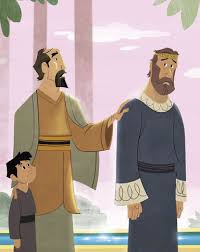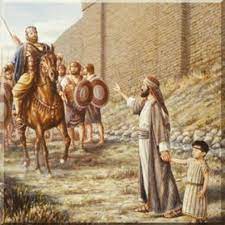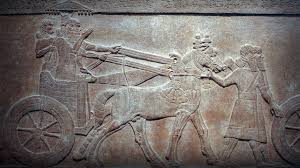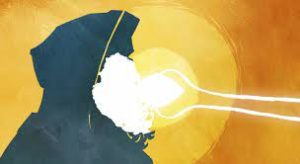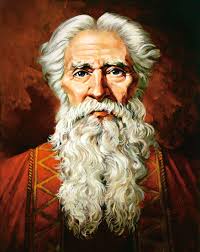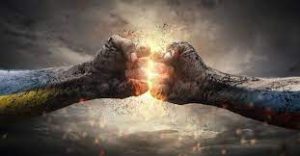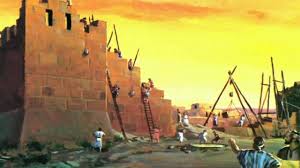Cd – In That Day the LORD Will Whistle 7: 18-25
In That Day the LORD Will Whistle
7: 18-25
In that day the LORD will whistle DIG: What images does Isaiah use here to show what Assyria will do to Judah? Which one is the most graphic to you? Why does Ahaz refuse to listen to Isaiah? Who causes this attack to take place? What did shaving the head and hair on the face signify? What does the phrase: In that day mean? Why was the abundance of milk not a good sign? What would the Land be good for? Almost two decades later, what kind of a decision did another king of Judah make? How was it different?
REFLECT: Where have you seen the sovereignty of God in your life? When was the last time you refused to listen to the LORD, only to face a crisis? What did you learn from that experience? How can you try to help others not make the same mistake? Can you remember the last time you were humiliated? When was the last time you were down-and-out because of some bad decisions you made? Did you ever have a second chance to turn the situation around? How did you handle it? Why?
These verses answer the question, “How will the coming days be unlike any since the division of the nation (7:17)?” The answer is a grim one. In that day the LORD will whistle, or signal, for the armies of Judah’s enemies to blanket the Land like swarms of bees or flies. The Judeans will be disgraced in defeat. The countryside will be so depopulated that there will be no one to eat the produce of the few remaining animals or to cultivate the once fertile hills. The Land will return to wilderness. Had Ahaz been able to believe that ADONAI is indeed present with His people, it need not have been so. But because he trusted something less than God, that object of trust now becomes the instrument of the very devastation he dreaded.29
God governs this world of ours. He shapes the destinies of nations, controls the course of empires, and determines the limits of dynasties. Individually, the LORD has established His throne in heaven and His kingdom rules over all (Psalm 103:19). Consequently, ADONAI used the nations of the world to discipline Isra’el. That was Isaiah’s message before the Assyrian invasion, and about one hundred years later it would be Jeremiah’s message to Judah before the Babylonian captivity (see the commentary on Jeremiah, to see link click Gu – Seventy Years of Imperial Babylonian Rule). Both were ignored, with dire consequences.
Earlier, Isaiah had depicted the LORD whistling for those at the ends of the earth. Saying, here they come, swiftly and speedily to devastate the land of Judah (5:26)! Now He specifies which nations those were. They were Assyria from the north, and Egypt from the south. Throughout its history, Isra’el has been caught between the civilizations of the Nile and the Mesopotamian valleys, each wanting to obtain her for their own advancement.
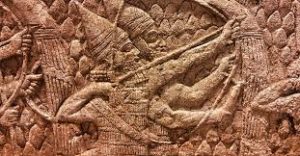
Because the nations of the world are controlled by the sovereignty of ADONAI, here He calls for them. In that day of judgment for Ahaz and the southern kingdom of Judah, the LORD would whistle for flies from the distant streams of Egypt. The annual flooding of the Nile River brought swarms of flies and the word streams in Hebrew is a technical word for Egypt’s irrigation canals. In other words, Egyptian soldiers were seen as numerous and bothersome as flies. And He would also whistle for bees from Assyria (7:18), which was well known for its beekeeping expertise. In other words, the Assyrian soldiers were as vicious as bees. Both the flies and the bees are metaphors for the swiftness of movement of the Egyptian and Assyrian hosts. The Egyptians and the Assyrians will battle each other, but the battleground will be Judah.
They will all come and settle. The Hebrew verb naha, which is used sixty-three times in the TaNaKh, always has the meaning given here, which is to settle or swarm. Their armies would be like flood waters, settling wherever they wanted. This would be frightening news to the Jews. Isaiah was saying that Judah would be swarming with Egyptians and Assyrians. They would be everywhere, even in the hardest to find places. The Land of Judah offers many such places; in the steep ravines and in the crevices in the rocks, on all the thornbushes and at all the water holes (7:19). But it will be impossible to escape from the invaders. Thinking that God would never allow His people or His Temple to be violated (see the commentary on Jeremiah Cc – False Religion is Worthless), the Jews living in Judea would indeed be shaken as the trees of the forest are shaken by the wind when the invasion came (7:2).
Isaiah stresses again that the invasion by Assyria will not be her own decision. She will merely be a tool in the hands of the sovereign LORD. This concept was basic to Jewish survival. If they believed, as was commonly thought at the time, that when one country conquered another it meant that the gods of the victors had defeated the gods of the conquered people, then they were doomed because their God was so small. However, if they could believe the LORD of heaven’s angelic armies (CJB) when He said: Whoever touches you touches the apple of My eye (Zechariah 2:8), then they could survive any attack that would come.
In that day, which would shortly come to pass, the LORD told king Ahaz that he would use a razor hired from beyond the Euphrates River as judgment for Judah’s unbelief. With a change in metaphor, Assyria is compared to a razor. More than likely, this is an ironic comment on Ahaz’s alliance with Assyria. He had entered into a covenant with Assyria, who would first, like a razor, viciously attack the northern kingdom of Isra’el and Syria. But little did he know that shortly afterward that same cutting razor, in the hands of ADONAI, would turn on him and his kingdom of Judah.
Ahaz probably tried to keep his alliance with the Assyrian king Tiglath-pileser a secret. Therefore, Isaiah shocked the king of Judah when he confronted him with the knowledge of the secret pact with the king of Assyria. As a true prophet of God, the secrets of the Almighty were his also. Humanly speaking, nothing could be hidden from him that the LORD wanted revealed. So it was with the alliance with the razor from beyond the River.
Isaiah informs king Ahaz that God would use that razor to figuratively shave your head and the hair on your legs, literally feet, and to take off your beards also (7:20). After the Assyrians defeated the Egyptians, they will shave Judah herself. That was the twist. The very one that Ahaz hired to shave Isra’el and Syria, will end up shaving Judah on the head, the beard and the hair on the face. In the Near East shaving one’s hair and beard was a sign of humiliation or deep distress (Job 1:20; Isaiah 15:2; Jeremiah 47:5 and 48:37; Ezekiel 7:18; Amos 8:10; Micah 1:16). So the contrast between head and feet, the visible and hidden body hair, express the totality of the humiliation, the indignities heaped on a subject people.
Humanly speaking, Judah will have no honor left. In a similar fate, French women who were known to have consorted with German soldiers during World War II had their heads shaved and were shamed in a public display of disloyalty.
Isaiah describes the deplorable condition of the Land after the invader had left his mark upon it. In that day, a man will keep alive a young cow and two goats (7:21). This represents a time of judgment on the nation of Judah. The phrase, in that day, is often used to refer to the time of extreme judgment in the Great Tribulation just before the Messiah returns (as in 4:2). But sometimes as we see here, it refers to the near historical judgment at the end of a particular time period. Here it refers to the judgment to come on the nation of Judah very soon.
And because of the abundance of the milk they give, he will have curds to eat. All who remain alive in the Land will eat curds and honey (7:22). Agricultural activity ceased, primitive conditions returned, and the survivors of the storm and strife were living precariously on the produce of their flocks. The abundance of milk was a troubling factor, not a good one. With so many animals dying, a farmer’s young cow and two goats would have no young to nurse; therefore, the milk (and curds from it) would be plentiful for the people. Honey would also be abundant because wild flowers would grow in the deserted fields and bee swarms would be more common. All this would fulfill the sign given to Ahaz by Isaiah (7:15) that he will eat curds and honey. Although Ahaz, through his human wisdom and political maneuvering, had plunged the nation into despair, God was still with His people. The survivors, although few, would be provided for.
In that day, in every place where there were a thousand vines worth a thousand silver shekels, there will be only briers and thorns (7:23). In addition, the farmers would have no crops because the farmland was destroyed. The vineyards would be ruined along with the farmland and only briers and thorns, would grow.
Judah would revert to wilderness. Men will go there with bow and arrow, for the Land will be covered with briers and thorns (7:24). To go there without any protection would be to invite attack from wild animals. The only thing the Land would be good for was hunting. Because it was covered with briers and thorns no farming was possible.
As for all the hills once cultivated by the hoe, you will no longer go there for fear of the briers and thorns; they will become places where cattle are turned loose and where sheep run (7:25). The land would only be good for grazing cattle and sheep. In 7:23-25 the devastation of the crops is seen. The farmers would have no crops because of the ruined farmland. That which was productive becomes only useful for hunting wild game or grazing by cattle and sheep, but not for planting. The vineyards would be ruined along with the cultivated land, and only briers and thorns, mentioned three times here, would grow.
There is a fascinating sequel to this story that will be fulfilled almost two decades later. Go back and read 7:3 again. A specific spot is mentioned where the confrontation took place between Isaiah the prophet, and Ahaz the king. At that one spot Ahaz was given the option. Trust in God or trust in Assyria. Ahaz made the wrong choice and ended up under the Assyrian yoke. Later he dies and his son, Hezekiah, becomes king. Hezekiah was still laboring under the Assyrian yoke for which his father was responsible. Against Isaiah’s advice and prophecies, Hezekiah rebelled against the Assyrians, and the Assyrians raided the Land. Forty-six cities were destroyed by the Assyrian invasion. Then only Jerusalem was left. Sennacherib sent his field commander with a large army from Lachish to King Hezekiah at Jerusalem. Then the commander stopped at the aqueduct of the Upper Pool, on the road to the Washerman’s Field (36:2). At the very place where Ahaz made the fatal choice of putting Judah under the Assyrian yoke, the field commander of the Assyrian army confronted Hezekiah. But the son made the right decision that his father did not make. Hezekiah made the decision to trust ADONAI, and He delivered Hezekiah and Jerusalem, just like He had wanted to do if Ahaz had acted in faith (Chapters 36 and 37).



